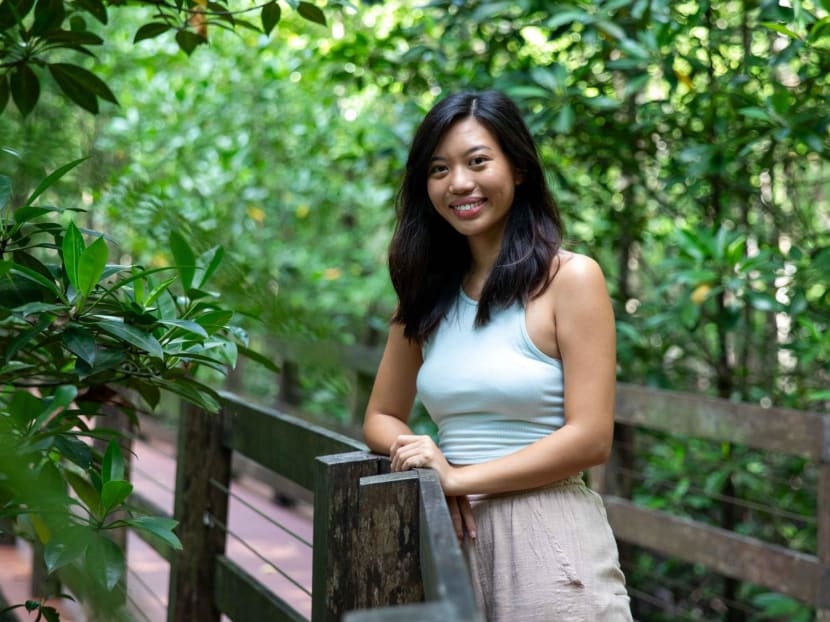Community Heroes: How I bring environmental issues to life in classrooms and help students cultivate a love for nature

Miss Cassandra Yip-Lee (pictured) is co-founder of Earth School.
I’m a passionate environmentalist who runs Earth School — a non-profit organisation that aims to increase environmental literacy among children and youth in Singapore.
I started Earth School as a ground-up initiative about three years ago at the peak of the Covid-19 pandemic with some of my classmates.
We were then all second-year students in the National University of Singapore’s Bachelor of Environmental Studies programme, and we have been sharing our love and knowledge about nature and the environment ever since!
I had previously worked at Young Sustainable Impact Southeast Asia, an incubator and accelerator for youth sustainability start-ups. I was inspired by the community there to one day also start something impactful.
This opportunity came in 2021, during the Covid lockdowns, when everyone was picking up new hobbies.
It made me think about my passions — nature and the environment — and what is missing in the current ecosystem: Education. Hence, Earth School came about.
A consensus among my classmates and I is that, growing up in Singapore, we had very limited to no exposure to nature-based or environmental studies.
I remember very clearly that my answer to questions such as “what do you want to be when you grow up?” was “marine biologist”, but that never seemed to be a career option.
We believe in giving young Singaporeans hope (and proof) that being an environmentalist is indeed a dream that can be realised in our country.
Over the past few years, we have worked directly with public schools, charities and grassroots communities to develop environmental education curriculums and pioneer sustainability initiatives.
More than 50 students from five primary schools took part in our first programme, Student Heroes in Environmental Leadership Development (Shield), in 2022.
Covid-19 regulations were still in place then, so we ran lessons online over Zoom.
The 10-week programme covered a different topic each week, such as clean and affordable energy, and sustainable cities and communities.
These are based on the United Nations’ Sustainable Development Goals, adopted in 2015 as a roadmap to creating a sustainable, equitable and prosperous world.
We aimed to introduce environmental sustainability topics to young students in the context of Singapore and help them understand the challenges that we face and what is being done to mitigate them.
A typical lesson would start off with an introduction to the topic, for example: “What is climate change? What is the science behind it? What are its impacts?”
This would include diagrams and videos. We even built an online simulation of Bukit Timah Nature Reserve and Central Catchment Nature Reserve ourselves.
We would also present big issues to our students, such as rising sea levels and deforestation.
One of the more memorable moments was when an 11-year old asked us: “What happens after the Semakau Landfill becomes full?”
We then realised that young Singaporeans had the intellectual and emotional capacity to think about their future here.
However, we no longer run the entire 10-week programme now due to the substantial resources required. Instead, we have taken individual lessons from it and continue to run them with various partners.
One of the biggest challenges we face is convincing mainstream schools and educators of the importance of climate science and environmental education, especially for students under the age of 12.
A common experience is when a profit-making educator or school approaches us to run a programme for them, and we get very excited about the opportunity to redesign a school wall to show parts of a terrestrial ecosystem, or build solar-powered cars with little girls.
However, when we ask what their budget is, it turns out that they were expecting us to run it for free, including covering the expenses for materials. Unfortunately, there is a common misconception that non-profit organisations have zero costs.
We learned from these experiences and have now prioritised working with non-governmental organisations (NGOs) and charities such as Glyph, Budding Minds and HCSA Dayspring to run free or heavily subsidised programmes for them.
These include outdoor in-nature lessons and some indoor activities such as microgreen growing.
We also have about 10 volunteers who help with nature walks, curriculum development and publicity.
We believe that exposure to the natural world can inspire creativity and innovation, as well as instil a sense of belonging and responsibility to care for our country’s green places and wildlife.
The best part about the work we do is when we see children get really excited — be it about spotting wildlife in their natural habitat or getting their hands dirty to grow their own microgreens.
In 2023, we decided to register Earth School as Earth Academy Limited, a company limited by guarantee. Being a non-profit organisation allows us to make environmental education affordable and accessible to all.
We are now working on building Singapore’s first nature classroom, which will be open to the community.
My advice to those interested in starting an environmental NGO is to not underestimate how far perseverance will take you.
Starting your own thing is incredibly challenging, but it’s a learning process where opportunities can present themselves when you least expect them.
ABOUT THE WRITER:
Cassandra Yip-Lee, 24, is a venture builder with Wavemaker Impact, a climate technology venture capital firm based in Singapore. She runs Earth School on the side as a passion project.
If you have an experience to share or know someone who wishes to contribute to this series, write to voices [at] mediacorp.com.sg (voices[at]mediacorp[dot]com[dot]sg) with your full name, address and phone number.






